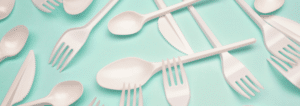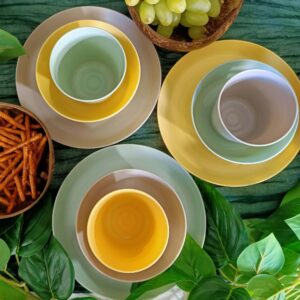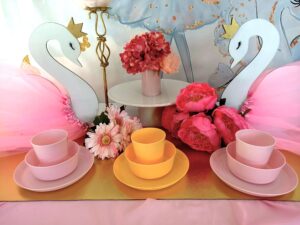In 2023 the NZ Government banned certain single use plastics that have affected what we use at parties. This is part of the government’s 3 stage plan to reduce avoidable single-use plastic waste in Aotearoa.
The new ban covers a range of single-use plastics including straws, single use tableware and cutlery. Polystyrene bowls and containers have already been banned as have compostable plastics. So what are our eco-friendly options for these party supplies?

Why are single-use plastic items being banned?
We are coming to a better understanding of how our consumer choices are affecting our plants, animals, lifestyle, health and environment. We have become dependent on our convenience choices but at a significant cost to our planet. While the problem seems huge, we can each make small changes that make a huge difference. Kate Meads (A leading waste educator in New Zealand) shares the idea that if everyone in NZ decided to use one less plastic tomorrow, imagine how much better off we would be?
Since mass manufacturing of plastics in the 1950s, it became cheaper to make single use plastics and convenient to use and dispose of. This included party supplies. Now, in 2024 we are seeing the environmental effects of mass consumption and a massive increase in the amount of rubbish we produce.
We are now learning to be more conscious of the effort and resources used to create these single use items and weighing that up with length of life of the product. We are learning how we can recycle certain plastics (or avoiding them entirely) and that our buying power does influence what products we want on offer. We are learning that we should care about where that product goes next. We are looking for more eco-friendly party options.
Very few single use plastics end up in the recycling bin. Having to rinse them, assessing how clean they need to be… it’s just easier to throw them in the bin. In landfill, rubbish is poured into a lined pit until it is full and then sealed off and the toxic gasses are sucked out. Essentially, little mausoleums of rubbish are being created for someone else to deal with at a later time. But when and who will that be? Some plastics can take an estimated 450 years to break down. What future are we leaving for Aotearoa?
Why it needed to be a law
“Over the course of the first year, the bans have prevented an estimated 200 million plastic straws, 600 million items of plastic cutlery, bowls and plates, and 150 million plastic produce bags from ending up in landfills or the environment. That’s 17,000 plastic bags, every hour.” Ministry for the Environment New Zealand.
How many of us have left our homework to the last minute? A legislation to enforce the eradication of certain plastics means we don’t have to worry about the ‘due date’. We are forced to find alternatives and we do adapt. If it’s not available, we can’t use it. If we can’t use it, we’re not contributing to the problem.
Today, the impact is already evident. Beach clean-up teams across New Zealand have noticed a significant reduction in plastic bag waste since the ban of plastic bags. A little change to use more reusable bag options has already started to make an impact on our environment.
Which items are not included in the new ban?
This new legislation doesn’t eradicate all plastic from disposable tableware.
The ban does not include single-use cups made from plastic, except polystyrene.
Food packaging, such as the plastic trays used for pre-packaged food in supermarkets, has also not be banned under this new legislation.
And of course, this isn’t a ban on all single-use tableware. Single-use tableware is still available to buy. You may have noticed items such as paper party plates in their place (some of these with a plastic coating).
If you do still have these plastic items at home, do use them up, just consider if they can be recycled (recycle numbers 1,2 or 5) or can be repurposed around your home.
So what are the alternatives?
Reusable! No waste. Have a party set at home, borrow someone else’s or hire what you need means for less carbon emissions from products traveling from the manufacturer to customs, to a warehouse, to a businesses storage warehouse to a shop and for you to travel to the shop to purchase… each time you have a party. Hiring from party hire businesses, like The Party Godmother, allows you to borrow what you are after and return it, ready for the next person to reuse.
Biodegradable and compostable products seem like a great eco-friendly option but do not break down as well as we would like, especially in New Zealand, adding to either landfill or decomposing chemicals into our soil. When we buy biodegradable or compostable products, how much of this waste are you willing to put in your compost/garden?
Being more mindful of how much we consume, how we can reuse these products and how we can recycle products before we think about sending them off to landfill, often is about us being more mindful, creative and respectful of how we ourselves live.

What’s the deal with reusables?
While reusable items may cost more initially, they are often more robust and can often be used for a lot longer than it’s disposable counterpart’s repeated cost.
When out for something like a picnic, having a wet bag (a reusable zip bag designed to hold children’s wet clothing or nappies) makes an easy way to cart used reusables home.
At a party, it is easy to have a waterproof box with a lid to place the used tableware in to bring home and wash. Many party hire places prefer to do the cleaning themselves.
Washing up is often quick and easy once you are home, and as much as we have been guided to believe that disposables are easier, are we willing to put in a small amount of effort to avoid a big problem?
Borrowing does make the whole process a lot easier. The Party Godmother supplies boxes of themed tableware, serveware, decorations and some kits even have matching costumes, to keep the whole process easy. Just book, pick up, party, return. Single-use items are avoided using this reusable service.

What’s the next step?
While eliminating single use plastic is great, it is surprising to discover that this does not include single-use plastic cups.
What would be great as a next step would be to eliminate single use plastic cups for mainstream and to have any plastic serveware/tableware either built more robust or be made from recyclable plastic. It would also be ideal to see more upcycle ideas on how we can use these plastic products at their end of intended life.
Unfortunately, the party supplies that have popped up in place of the single use plastics are still essentially single use and therefore ending up in landfill. Without a clear understanding of how recycling works like ‘how much food can be on a paper plate before it is not allowed in the recycling?’ or ‘do I have to rinse plastic bottles before they’re recycled?’, it’s essentially being left open for individual interpretation and more mixed waste (dirty recycling contaminating clean recycling) ending up in landfill.
The fact there are so many single use party supply and balloon companies around still makes me cringe. Cheap, quick, environmentally destructive.
Breaking our single-use habits is not going to be easy and it asks businesses and consumers to accept changes that not everyone will like. But we must change if we want a healthier world in our future.
Sherie Hinga

